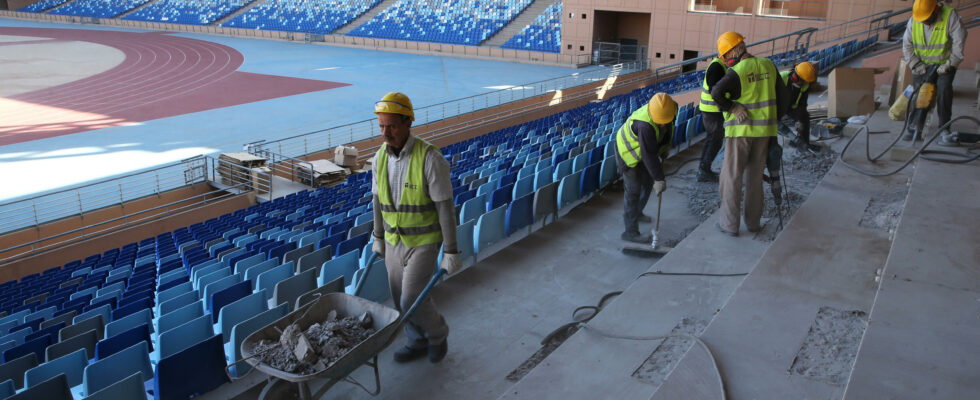After several unsuccessful attempts, Morocco, designated co-host of the 2030 edition, will realize its dream of organizing a World Cup, also an opportunity for the kingdom to develop its economy and increase its influence via “the football diplomacy”.
Future co-organizer of this 2030 World Cup with Spain and Portugal, the kingdom has demonstrated perseverance: the first African country to be a candidate, with a view to the 1994 edition, Rabat then accumulated failures, four other times, notably seeing the 2010 World Cup slip under his nose to the benefit of South Africa, a heartbreaker at the time.
These three decades of frustration will be officially averted on Wednesday when the International Federation (Fifa) approves the candidacy of the three countries, the only file retained by the supreme body of world football. And Morocco is already salivating in advance of the multiple benefits it wants to reap.
This World Cup is “ a unique opportunity to accelerate the growth dynamic of the economy (…), to create more job opportunities and to help develop tourist attractiveness“, commented Fouzi Lekjaa, the president of the 2030 World Cup Committee, during a recent council of ministers chaired by the king.
Morocco, a country of 38 million inhabitants, recorded a growth rate of 2.8% and an unemployment rate of 13.6% until the third quarter of 2024, according to official figures.
However, on the horizon of the 2030 World Cup, Rabat is thinking big, with multiple projects, including “ the expansion and renovation of the airports of the six host cities “, ” strengthening road infrastructure “, And ” the development of hotel and commercial infrastructure », According to a press release published at the end of the council of ministers.
The final at “ Casa »?
Proof of this ambition, in addition to the upgrade of six stadiums in Rabat, Casablanca, Fez, Tangier, Marrakech and Agadir, the kingdom does not intend to give Spain or Portugal the luxury of hosting the future final of the test, with a weighty argument: the construction of a 115,000-seat stadium in Benslimane, near Casablanca, for a budget of 480 million euros.
But Morocco’s ambition does not stop at the economic sector alone, and if the infrastructures of the World Cup ” will be a legacy “, the North African country has understood the importance of sport in promoting its image, notes sports policy researcher Moncef El Yazghi.
Also read2026 World Cup: schedule and results of qualifiers in Africa
A point of view shared by the sociologist specializing in sports sciences Abderrahim Bourquia, for whom the co-organization of the World Cup will also “ to associate Morocco with the so-called “positive” values of sport, quality of life and trust », at a time when the kingdom seeks to further extend its influence, particularly on the continent.
A historically open country, particularly towards Europe, Morocco has in fact turned over the past decade towards sub-Saharan Africa, where multiple investments have been launched and where its presence has been significantly strengthened.
Since her return to the African Union in 2017, a body she had left four decades earlier due to the dispute over Western Sahara, “ we witnessed football diplomacy towards the countries of the continent », underlines Mr. El Yazghi. He cites the 44 partnership agreements concluded with African football federations in recent years.
And if an appointment had been missed in 2015 – due to an Ebola epidemic on the continent – Morocco will organize the African Cup of Nations (CAN) in 2025, after having hosted the women’s event in 2023, as well as several editions of the Club World Cup.
Supporting context
The kingdom also believes that the organization of the World Cup comes in a promising diplomatic context, while several countries, including Spain, have recognized its sovereignty over Western Sahara, a territory that it mainly controls, but which the separatists dispute with it. of the Polisario Front supported by Algeria.
The agreement between Rabat and Madrid has also “ certainly opened the door to reflection on the joint organization of the World Cup », Notes the expert in international relations, Tajeddine El-Husseini.
Not to spoil anything, the sporting horizon is also clear: since 1986 and the historic qualification of the Atlas Lions in the 2nd round of the Mexican World Cup, the selection has grown, to the point of becoming at the end of 2022, in Qatar, the first nation African and Arab to reach the last four.
But there is still room for improvement for Moroccan football, which only has 90,000 members, according to Moncef El Yazghi.
In addition to the growing enthusiasm that the organization of the World Cup should generate, the Moroccan Federation (FRMF) launched a partnership in August with the global phosphate giant OCP, in order to finance training centers for professional players.
Enough to train the future Yassine Bounou, Achraf Hakimi or Hakim Ziyech, among the heroes of the epic of the last World Cup in Doha.
